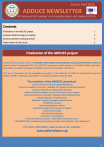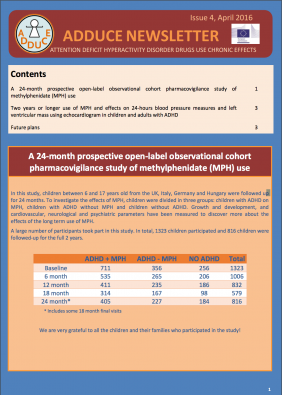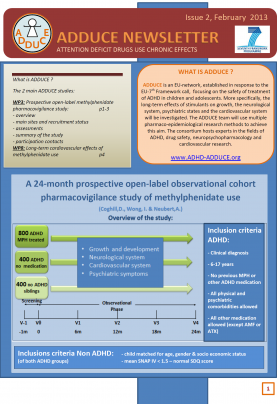News
The fifth ADDUCE Newsletter is now available!
Here, you can read about the finalisation of the project,

and the dissemination of the results!
Did you participate in the ADDUCE studies and are you curious about the latest news on the project?
Here you can find some information!
News for children, April 2015
News for adolescents, April 2015
News for parents, April 2015

and much more in the ADDUCE Newsletter 3, March 2015
The second ADDUCE Newsletter is available!
Read more about the 2 main ADDUCE studies:
-
WP3: prospective open-label methylphenidate
pharmacovigilance study - WP8: long-term cardiovascular effects of methylphenidate use
and much more in the ADDUCE Newsletter 2, February 2013

Events
16 - 19 OCTOBER 2016:
4rd EUNETHYDIS International Conference on ADHD, Berlin - Germany
from basis neuroscience to optimised clinical care
17 & 18 APRIL 2016:
ADDUCE Consortium meeting, London - UK
28 - 31 MAY 2015:
5th World Congress on ADHD: from Child to Adult Disorder, Glasgow - Scotland
20 & 21 APRIL 2015:
ADDUCE Consortium meeting, Salina - Italy
21 - 24 MAY 2014:
3rd EUNETHYDIS International Conference on ADHD, Istanbul - Turkey
ADHD and related disorders
19 & 20 MAY 2014:
ADDUCE Consortium meeting, Istanbul - Turkey
3 - 6 OCTOBER 2013:
23rd EUNETHYDIS Network Meeting, Prague Czech Republic
A meeting of the European Network of Hyperkinetic Disorders
6 - 9 JUNE 2013:
4th World Congress on ADHD: from Childhood to Adult Disease, Milan - Italy
4 & 5 JUNE 2013:
ADDUCE Consortium meeting, Milan - Italy
6 & 7 JUNE 2012:
ADDUCE Consortium meeting, Cagliari - Italy
23 MAY 2012:
2nd EUNETHYDIS International Conference on ADHD, Barcelona - Spain
 The ADDUCE Consortium. An EU-7th Framework Funded Network under HEALTH
The ADDUCE Consortium. An EU-7th Framework Funded Network under HEALTH















